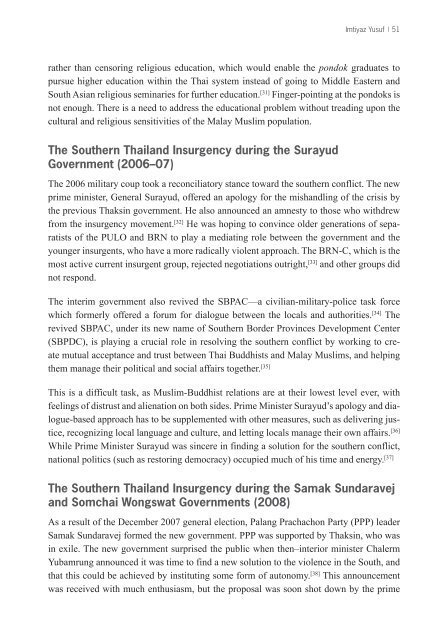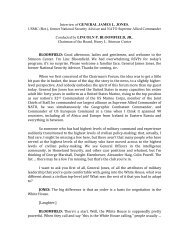Islam and Politics - The Stimson Center
Islam and Politics - The Stimson Center
Islam and Politics - The Stimson Center
Create successful ePaper yourself
Turn your PDF publications into a flip-book with our unique Google optimized e-Paper software.
Imtiyaz Yusuf | 51<br />
rather than censoring religious education, which would enable the pondok graduates to<br />
pursue higher education within the Thai system instead of going to Middle Eastern <strong>and</strong><br />
South Asian religious seminaries for further education. [31] Finger-pointing at the pondoks is<br />
not enough. <strong>The</strong>re is a need to address the educational problem without treading upon the<br />
cultural <strong>and</strong> religious sensitivities of the Malay Muslim population.<br />
<strong>The</strong> Southern Thail<strong>and</strong> Insurgency during the Surayud<br />
Government (2006–07)<br />
<strong>The</strong> 2006 military coup took a reconciliatory stance toward the southern conflict. <strong>The</strong> new<br />
prime minister, General Surayud, offered an apology for the mish<strong>and</strong>ling of the crisis by<br />
the previous Thaksin government. He also announced an amnesty to those who withdrew<br />
from the insurgency movement. [32] He was hoping to convince older generations of separatists<br />
of the PULO <strong>and</strong> BRN to play a mediating role between the government <strong>and</strong> the<br />
younger insurgents, who have a more radically violent approach. <strong>The</strong> BRN-C, which is the<br />
most active current insurgent group, rejected negotiations outright, [33] <strong>and</strong> other groups did<br />
not respond.<br />
<strong>The</strong> interim government also revived the SBPAC—a civilian-military-police task force<br />
which formerly offered a forum for dialogue between the locals <strong>and</strong> authorities. [34] <strong>The</strong><br />
revived SBPAC, under its new name of Southern Border Provinces Development <strong>Center</strong><br />
(SBPDC), is playing a crucial role in resolving the southern conflict by working to create<br />
mutual acceptance <strong>and</strong> trust between Thai Buddhists <strong>and</strong> Malay Muslims, <strong>and</strong> helping<br />
them manage their political <strong>and</strong> social affairs together. [35]<br />
This is a difficult task, as Muslim-Buddhist relations are at their lowest level ever, with<br />
feelings of distrust <strong>and</strong> alienation on both sides. Prime Minister Surayud’s apology <strong>and</strong> dialogue-based<br />
approach has to be supplemented with other measures, such as delivering justice,<br />
recognizing local language <strong>and</strong> culture, <strong>and</strong> letting locals manage their own affairs. [36]<br />
While Prime Minister Surayud was sincere in finding a solution for the southern conflict,<br />
national politics (such as restoring democracy) occupied much of his time <strong>and</strong> energy. [37]<br />
<strong>The</strong> Southern Thail<strong>and</strong> Insurgency during the Samak Sundaravej<br />
<strong>and</strong> Somchai Wongswat Governments (2008)<br />
As a result of the December 2007 general election, Palang Prachachon Party (PPP) leader<br />
Samak Sundaravej formed the new government. PPP was supported by Thaksin, who was<br />
in exile. <strong>The</strong> new government surprised the public when then–interior minister Chalerm<br />
Yubamrung announced it was time to find a new solution to the violence in the South, <strong>and</strong><br />
that this could be achieved by instituting some form of autonomy. [38] This announcement<br />
was received with much enthusiasm, but the proposal was soon shot down by the prime

















